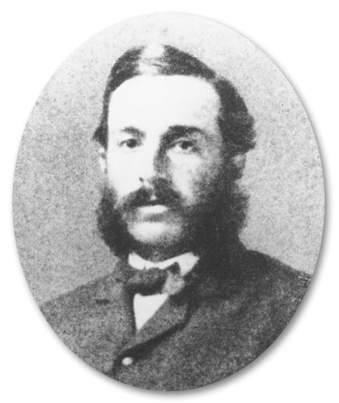Ship's Crew

George Dewey
Rank(s): Lieutenant Commander
Dates of Service: 11/6/1867 - 8/1/1870
Birth Date: 12/26/1837
Death Date: 1/20/1917
George Dewey was born on December 26, 1837, in Montpelier, Vermont and graduated from the U.S. Naval Academy in June 1858. As a midshipman, Dewey served on the steam frigate Wabash. After this service, he became a passed midshipman in 1861. From 1861 to 1867, Dewey served on the sidewheel steamer Mississippi and the screw sloops Brooklyn and Canadaigua, as well as the side-wheel gunboat Agawam, the screw frigate Colorado, and the steam sloop Kearsarge, before returning to Colorado. In September 1867, Dewey was detached and ordered to the Naval Academy in charge of the fourth class of midshipmen.
During their first year, midshipmen lived aboard the training ships stationed at Annapolis, which included Constitution. Dewey was the senior instructor on Constitution from November 6, 1867 to August 1, 1870. He was also in charge of the frigate Constellation while it was berthed at Annapolis.
On October 10, 1870, Dewey took command of the screw sloop Narragansett. Dewey crossed the Atlantic under sail and took supplies to London. Upon his return, he was sent to the Naval Torpedo Station at Newport, Rhode Island in 1872. While he was at Newport, he received promotion to commander in 1873 and was given Narragansett again. After a long cruise, he was appointed as a lighthouse inspector in August 1875 for the Second Naval District, headquartered in New York City. On May 1, 1878, he was promoted to secretary of the Lighthouse Board. However, he soon returned to active duty.
On October 18, 1882, Dewey was ordered to command the steam sloop Juniata and remained at sea until July 1884. Later, after achieving rank of captain, he commanded the newly built unarmored cruiser Dolphin from October 1884 until he transferred to take command of the screw steamer Pensacola in March 1885. In 1888, Dewey returned to Washington to become chief of the Bureau of Equipment in the Navy Department, where he remained until 1896 when he was commissioned commodore and transferred to the Board of Inspection and Survey. Believing that the Washington climate was bad for his health, Dewey asked for and received command of the Asiatic Squadron.
On April 24, 1898, Spain declared war on the United States and the U.S. retaliated with its declaration on Spain on April 25, 1898, back-dated to April 21. The instigating factor was the unexplained explosion of USS Maine in the harbor of Havana. The U.S. was drawn into Cuba’s struggle for independence from Spain and the conflict included the Spanish possessions of Guam, Puerto Rico, and the Philippines. On May 1, 1898, Dewey sailed his squadron into Manila Bay, Phillipines and in a few short hours destroyed the anchored Spanish fleet. Later that summer, the U.S. Army occupied Manila. When he returned home, public opinion of Dewey was so high that he began a campaign for President of the United States, only for it to be scuttled by public relations disasters.
After his great service, he was promoted to admiral effective March 8, 1899. He also received the special honor of being promoted to the rank of admiral of the navy, which was created by a special act of Congress. The rank was conferred on Dewey on March 24, 1903, and backdated to March 2, 1899. He held the rank until his death in 1917. Dewey is the only person to have held the rank of a six-star admiral and joined the select group of six-star holders from other military branches, including General George Washington. Dewey died on January 20, 1917.
Dewey’s service has been honored in the naming of a destroyer (1934), a guided missile frigate (1959), and a guided missile destroyer (2010).